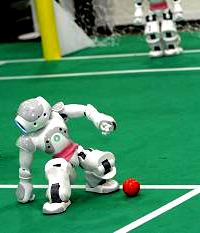Ronaldo meets R2D2 in robot world cup
 Next week marks the start of the football World Cup many have been waiting for.
Next week marks the start of the football World Cup many have been waiting for.
The RoboCup World Championships kick off in Brazil next week, and while the android competitors do not draw the same crowds or sponsorship deals, it can be certain that there will be no biting or emotional appeals to the referee.
Also, just like n the organic domain, Germany will be the team to beat.
There will be some decent Australian representation at the five-a-side robot rumble.
University of New South Wales has entered a team, and their athletic automatons are ready to test their mettle against rivals in the world’s largest robot competition.
“I think we’ve got a good chance of winning this year. We’ve done a lot of hard work on various skill elements and we’ve introduced a couple of new techniques,” says Maurice Pagnucco, Head of UNSW’s School of Computer Science and Engineering.
“We’ve developed a nice little sidestep to help us go around opposing players,” he said.
There is no remote control for the mechanical Manchester United, everything needs to be pre-programmed.
The UNSW team uses the intense training of about 125,000 lines of code to help the ‘bots move, kick, recognise colours, shapes, lines on the field and the all-important goal posts.
They do come with some very human frailties, and therefore require a full physical support team.
“They break joints all the time – they go through a lot of knee joints – the gears wear out so we need to take extra parts – and extra players,” says PhD student Sean Harris, who is heading to his fourth World RoboCup tournament.
For the first time this year, the teams will include a robot coach, but they will not storm the sidelines in shouting in expensive suits.
“He sits on the sidelines and can take an overview of play and send strategies to the team, albeit with a 10-15 second delay,” Harris says.
RoboCup plays an important role inspiring and motivating research into cognitive robotics and machine learning.
“It is an excellent training ground. Working on such a massive project tests all the fundamentals of programming. The students also pick up a lot of skills around project management and teamwork,” says academic supervisor Bernhard Hengst.
The tournament, which runs from July 19-25 in the Brazilian coastal town of Joao Pessoa, will involve more than 3000 participants from 45 countries – and an equal number of robots.
The UNSW team provided the following sneak peek into their elite training regime.







 Print
Print